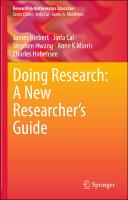Doing Research: A New Researcher’s Guide
| dc.contributor.author | Hiebert, James | |
| dc.contributor.author | Cai, Jinfa | |
| dc.contributor.author | Hwang, Stephen | |
| dc.contributor.author | Morris, Anne K | |
| dc.contributor.author | Hohensee, Charles | |
| dc.date.accessioned | 2022-12-13T12:38:56Z | |
| dc.date.available | 2022-12-13T12:38:56Z | |
| dc.date.issued | 2023 | |
| dc.identifier | ONIX_20221213_9783031190780_36 | |
| dc.identifier.uri | https://library.oapen.org/handle/20.500.12657/60177 | |
| dc.description.abstract | This book is about scientific inquiry. Designed for early and mid-career researchers, it is a practical manual for conducting and communicating high-quality research in (mathematics) education. Based on the authors’ extensive experience as researchers, as mentors, and as members of the editorial team for the Journal for Research in Mathematics Education (JRME), this book directly speaks to researchers and their communities about each phase of the process for conceptualizing, conducting, and communicating high-quality research in (mathematics) education. In the late 2010s, both JRME and Educational Studies in Mathematics celebrated 50 years of publishing high-quality research in mathematics education. Many advances in the field have occurred since the establishment of these journals, and these anniversaries marked a milestone in research in mathematics education. Indeed, fifty years represents a small step for human history but a giant leap for mathematics education. The educational research community in general (and the mathematics education community in particular) has strongly advocated for original research, placing great emphasis on building knowledge and capacity in the field. Because it is an interdisciplinary field, mathematics education has integrated means and methods for scientific inquiry from multiple disciplines. Now that the field is gaining maturity, it is a good time to take a step back and systematically consider how mathematics education researchers can engage in significant, impactful scientific inquiry. | |
| dc.language | English | |
| dc.relation.ispartofseries | Research in Mathematics Education | |
| dc.subject.classification | thema EDItEUR::J Society and Social Sciences::JN Education | en_US |
| dc.subject.classification | thema EDItEUR::J Society and Social Sciences::JN Education::JNZ Study and learning skills: general | en_US |
| dc.subject.classification | thema EDItEUR::J Society and Social Sciences::JN Education::JNU Teaching of a specific subject | en_US |
| dc.subject.other | Research questions | |
| dc.subject.other | Hypotheses | |
| dc.subject.other | Theoretical framework | |
| dc.subject.other | Scientific inquiry | |
| dc.subject.other | Robust methods | |
| dc.subject.other | Interpretation of findings | |
| dc.subject.other | Pilot study | |
| dc.subject.other | Unexpected findings | |
| dc.subject.other | Continuous improvement | |
| dc.subject.other | Communicating research | |
| dc.subject.other | Learning opportunities | |
| dc.subject.other | Impact on practice | |
| dc.title | Doing Research: A New Researcher’s Guide | |
| dc.type | book | |
| oapen.identifier.doi | 10.1007/978-3-031-19078-0 | |
| oapen.relation.isPublishedBy | 6c6992af-b843-4f46-859c-f6e9998e40d5 | |
| oapen.relation.isFundedBy | c6574ef1-49c1-45c9-bb53-af9801d59606 | |
| oapen.relation.isbn | 9783031190780 | |
| oapen.imprint | Springer | |
| oapen.pages | 136 | |
| oapen.place.publication | Cham | |
| oapen.grant.number | [...] |

